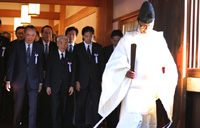|
 |
Beijing expressed to Tokyo its "serious concerns and firm opposition" on Friday after more than 100 Japanese lawmakers made a pilgrimage to the shrine that honors Class-A war criminals from World War II.
Observers said the trip to Yasukuni Shrine will "backfire" as it came while the Japanese Cabinet is trying to kick-start Sino-Japanese relations with a planned meeting of the two countries' leaders at the upcoming APEC Economic Leaders' Meeting next month in Beijing.
On Friday morning, media noted that while Japanese Prime Minister Shinzo Abe did not visit the shrine, he offered a ritual offering - a "masakaki" tree.
Abe's donation was followed by worship from a multiparty group of 110 national lawmakers.
Frequent visits by prominent Japanese figures to the Yasukuni Shrine have long clouded Japan's relationship with its Asian neighbors - especially China and South Korea - in past decades. Sino-Japanese ties sank to a new low in December after Abe himself made a pilgrimage to the shrine.
China is greatly concerned about "the negative developments within Japan" regarding the Yasukuni Shrine, Foreign Ministry spokesman Hong Lei told reporters on Friday.
The relationship will not achieve a healthy and stable development unless "Japan substantially faces up to and expresses sincere remorse for its aggressive past and draws the line with militarism", the spokesman said.
Beijing called upon Tokyo to properly handle such issues in a responsible manner and honor its statements and commitments on these historical issues.
A spokesperson of the Chinese delegation to the Asia-Europe Meeting in Milan, Italy, said on Friday that Premier Li Keqiang did not hold any meeting with Japanese Prime Minister Shinzo Abe.
Abe "came to shake hands with Premier Li" during a banquet held on Thursday, the spokesperson said.
Yang Bojiang, deputy director of the Institute of Japanese Studies at the Chinese Academy of Social Sciences, said Tokyo's recent diplomatic overtures "may end up being total hypocrisy" if the Japanese Cabinet refuses to change its revisionist-history approach.
Abe's repeated calls for an official meeting with Chinese leaders "may have been made because of pressure from within and outside of Japan", while the Japanese prime minister has failed to provide any tangible action that correspond to his promises, Yang said.
Zhou Yongsheng, a professor of Japanese studies at China Foreign Affairs University, warned that "Japan has not expressed sufficient remorse" for its aggression and expansionism during World War II, and some Japanese figures even believe that Japan waged the war to "free Asian people from the colonists of the West".
South Korea also criticized Abe's move, saying Japanese political leaders "should clearly remember they are negating the premise and the international order under which Japan returned to international society after the war when they show respect and gratitude to the shrine, which honors Class-A war criminals as gods".
Japanese upper house lawmaker Kazuyuki Hamada told a Friday international symposium in Tianjin that "Northeast Asian countries will never establish a real win-win situation among them if the historical issues are not successfully resolved and mutual trust not finally built".
Su Hang in Tianjin and Xinhua contributed to this story.
zhangyunbi@chinadaily.com.cn
